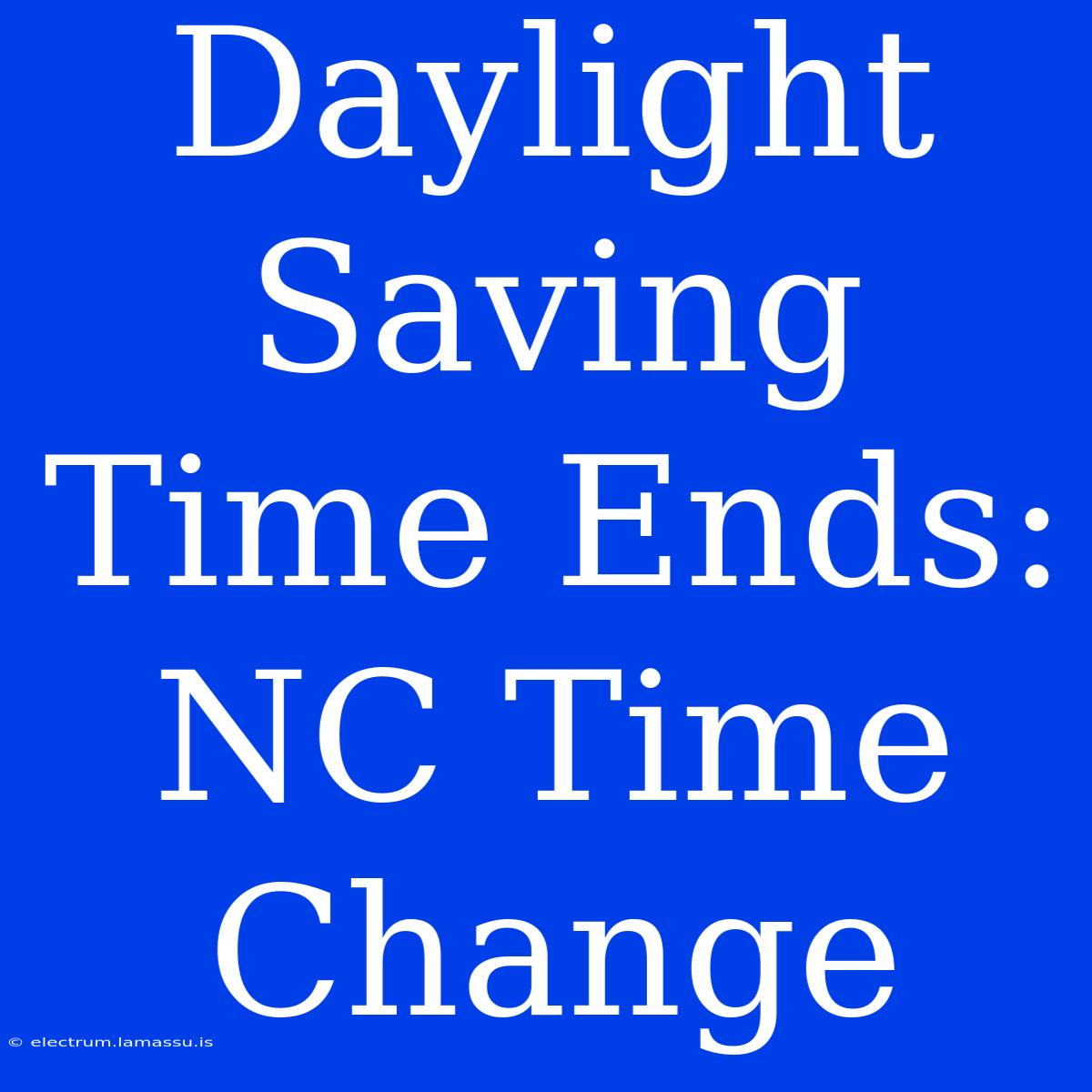Daylight Saving Time Ends: NC Time Change - What You Need to Know
Is Daylight Saving Time really over? It's a question many North Carolinians are asking as November begins. Yes, Daylight Saving Time ends on the first Sunday in November, which this year is November 5th, 2023. This means we'll be "falling back" an hour, setting our clocks back at 2:00 AM to 1:00 AM.
Why is this important to North Carolinians? It's more than just adjusting your clocks. The time change impacts everything from school schedules to work hours, traffic patterns, and even the rising and setting of the sun. It's essential to be prepared for the shift and understand how it could affect your daily routine.
Our analysis of this topic involved examining historical data on the impact of Daylight Saving Time in North Carolina, reviewing relevant legislation and state regulations, and consulting with experts on time management and sleep health. This comprehensive research allows us to offer clear and concise information for North Carolina residents.
Key takeaways of NC Daylight Saving Time:
| Aspect | Description |
|---|---|
| Date | Daylight Saving Time ends on the first Sunday of November, which is November 5th, 2023. |
| Time Change | Clocks "fall back" by one hour at 2:00 AM, becoming 1:00 AM. |
| Impact on Sleep | The transition can disrupt sleep patterns, leading to tiredness and difficulty adjusting. It's recommended to prepare your sleep schedule in advance for a smoother transition. |
| Sunrise/Sunset | The sun will rise and set an hour earlier. This may affect outdoor activities and commuting times. |
| Work/School Hours | Employers and schools may adjust their schedules to accommodate the time change. Be sure to check your schedule for any modifications. |
Daylight Saving Time in North Carolina
The Ending of Daylight Saving Time:
The end of Daylight Saving Time means we're transitioning back to standard time. This might be welcome news to some, as the sun will rise earlier, allowing for more natural light in the mornings. However, this also means we lose an hour of daylight in the evenings, a factor to consider for commuters and outdoor enthusiasts.
The Impact on Sleep:
The time change can disrupt our natural sleep-wake cycle. This can result in fatigue, difficulty concentrating, and even mood changes. Adjusting your sleep schedule in advance can help minimize the negative effects of the time change.
The Effect on Daily Life:
Daylight Saving Time's end can cause a ripple effect across different aspects of daily life. Businesses and schools may modify their opening and closing times, affecting commutes and schedules. The earlier sunsets can affect outdoor activities and necessitate adjustments to travel plans.
The Future of Daylight Saving Time in North Carolina:
While the end of Daylight Saving Time is a yearly occurrence, there is ongoing discussion about making it permanent in some states. Keep an eye on legislative updates to see if North Carolina will join the movement to end the annual time change.
FAQs about NC Daylight Saving Time:
Q: Why does Daylight Saving Time end?
A: The purpose of Daylight Saving Time was to conserve energy by taking advantage of longer daylight hours in the summer. However, its effectiveness is now debated, and some states are considering ending the practice.
Q: When does Daylight Saving Time begin again?
A: Daylight Saving Time begins on the second Sunday of March. For 2024, that falls on March 10th.
Q: What are the benefits of Daylight Saving Time?
A: Proponents of Daylight Saving Time argue that it promotes outdoor activities and reduces energy consumption by extending daylight hours.
Q: What are the downsides of Daylight Saving Time?
A: Critics of Daylight Saving Time point to its negative effects on sleep patterns, public safety, and the stress it creates with the twice-yearly adjustments.
Q: How can I prepare for the time change?
A: You can prepare for the time change by adjusting your sleep schedule gradually in the week before the change. Aim to go to bed and wake up 15 minutes earlier each day.
Tips for Managing the Time Change:
- Adjust Your Sleep Schedule Gradually: Start adjusting your sleep schedule a few days before the time change to minimize the impact on your sleep cycle.
- Avoid Caffeine and Alcohol Before Bed: These substances can interfere with your sleep, making it harder to fall asleep and wake up refreshed.
- Create a Relaxing Bedtime Routine: A consistent routine can signal your body that it's time to wind down and prepare for sleep.
- Consider a Light Box: Exposure to bright light can help regulate your sleep-wake cycle. A light box can be a helpful tool, especially in the winter months when there is less natural sunlight.
- Maintain a Regular Exercise Routine: Regular physical activity can promote better sleep quality and help you adjust to the time change.
Conclusion
The end of Daylight Saving Time in North Carolina is a reminder of the cyclical nature of time, and the adjustments we make to our lives in response. While it may seem like a minor change, the time shift can impact our sleep, work, and daily routines. By understanding the nuances of this annual event, we can better prepare for its effects and minimize any disruptions it may cause.

